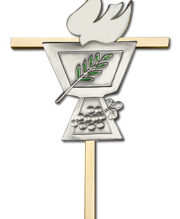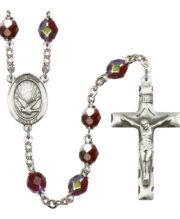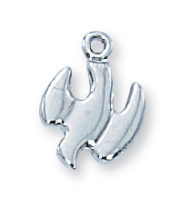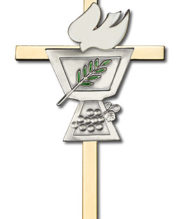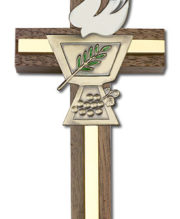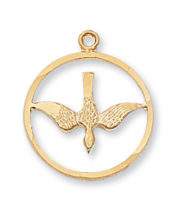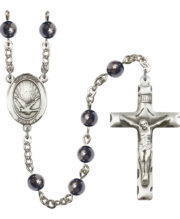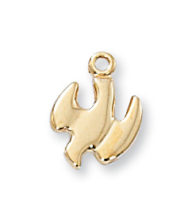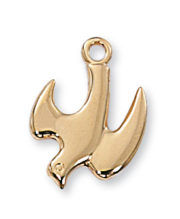Religious Education
Confirmation Gift Ideas for Teenage Girls and Boys
What is confirmation?
Confirmation is one of the seven sacraments in the Catholic Church. It is a sacrament of initiation in which a baptized person receives the gifts of the Holy Spirit through the anointing with chrism oil and the laying on of hands by a bishop or priest. This sacrament strengthens the individual to live a life of faith, and to bear witness to Christ in word and action. Confirmation is usually received by Catholic youth, but adult Catholics can also receive it. It is usually received after the person has reached the age of reason, and has undergone some period of instruction and formation in the Catholic faith, and it is considered as a deepening of baptismal grace. Confirmation is often seen as the moment when a person fully commits to a life of faith, and it is seen as a moment of strengthening and empowerment, enabling them to bear witness to their faith in the world.
 A confirmation is when a young person decides to fully embrace their faith and become a fully initiated member of the Church. It’s a sacrament that strengthens the gifts of the Holy Spirit received at baptism and equips the individual to live as a faithful witness to Jesus Christ.
A confirmation is when a young person decides to fully embrace their faith and become a fully initiated member of the Church. It’s a sacrament that strengthens the gifts of the Holy Spirit received at baptism and equips the individual to live as a faithful witness to Jesus Christ.
The origins of Confirmation can be traced back to the early Christian Church where candidates for baptism were required to give a public profession of faith and to be anointed with oil as a sign of the gifts of the Holy Spirit. Over time, Confirmation became more distinct from baptism and it was separated from it. The bishop or an ordained priest would confer the sacrament, instead of the person who baptize, which is the practice in the early church.
In the Catholic Church, Confirmation is considered one of the sacraments of initiation along with Baptism and Eucharist. It is usually administered to young people around the age of 14, although it can also be administered to adult converts who have been baptized and wish to enter into full communion with the Catholic Church.
The rite of Confirmation consists of the anointing with chrism (a mixture of oil and balsam, consecrated by the bishop) and the laying on of hands by the bishop or a priest, who invokes the gifts of the Holy Spirit. The confirmand chooses a confirmation name, often a saint’s name, as a symbol of their commitment to the faith and as a guide for their life.
Confirmation is a significant sacrament in the Catholic Church and it marks a young person’s decision to fully embrace their faith. It equips them with the gifts of the Holy Spirit, which are necessary for living a life of faith and service to others. It’s a sacrament that should be taken seriously and prepared for with prayer, study and reflection.
Confirmation is a sacrament that strengthens the gifts of the Holy Spirit received at baptism and equips the individual to live as a faithful witness to Jesus Christ. It’s a sacrament of initiation and a significant step in a young person’s faith journey, which should be taken seriously and prepared for with prayer, study, and reflection. It’s an opportunity to deepen their relationship with God and to be strengthened by the Holy Spirit to live their faith more fully.
How was confirmation established in the Catholic Church?
Confirmation is one of the seven sacraments of the Catholic Church, and it has evolved over time. It is believed that the practice of Confirmation has its roots in the early Christian Church, where candidates for baptism were required to give a public profession of faith and to be anointed with oil as a sign of the gifts of the Holy Spirit.
During the 2nd century, the practice of Confirmation became more distinct from Baptism, and it was separated from it. The bishop or an ordained priest would confer the sacrament, instead of the person who baptize, which is the practice in the early church. This was done to emphasize the role of the bishop as a successor of the apostles in the local Church.
During the 4th century, Confirmation became more closely associated with the rite of Chrismation, which is the anointing with holy oil, and the conferral of the gifts of the Holy Spirit. This sacrament was considered necessary for full initiation into the Church and for the strengthening of the faithful for the service of the Church.
In the Middle Ages, Confirmation came to be seen as the sacrament of spiritual maturity, and it was usually administered to young people around the age of 14. This age was chosen because it was considered the age of reason and the age at which one could make a mature profession of faith.
In the current Catholic Church, Confirmation is considered one of the sacraments of initiation, along with Baptism and Eucharist. It is administered by a bishop or a priest, who anoints the candidate with chrism (a mixture of oil and balsam, consecrated by the bishop) and lays his hands on the candidate, invoking the gifts of the Holy Spirit. It is also a sacrament that is given to adult converts who have been baptized and wish to enter into full communion with the Catholic Church.
What is the eligibility to be confirmed in the Catholic Church?
To be eligible for Confirmation in the Catholic Church, an individual must meet several criteria:
-
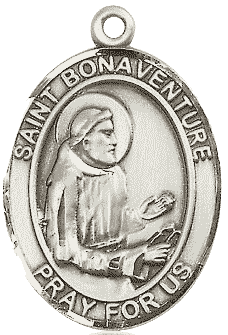 They must have been baptized in the Catholic Church.
They must have been baptized in the Catholic Church. -
They should have reached the age of reason, which means that they have the ability to understand the meaning of the sacrament and make a personal commitment to their Catholic faith.
-
They should have received the sacrament of First Communion, which is the initiation into the Eucharist, and is usually received around the age of 7-12 years old.
-
They should be properly prepared and educated in the Catholic faith, which is usually done through religious education classes or a Confirmation program in a Catholic school or parish.
-
They should be in a state of grace, which means they are living in accordance with the teachings of the Church and are free from mortal sins.
-
They should have the intention to receive the sacrament and be willing to live out their Catholic faith.
What is the Rite of Christian Initiation of Adults (RCIA)?
The Rite of Christian Initiation of Adults (RCIA) is the process by which adults become members of the Catholic Church. It is a process of formation and education that is designed to introduce non-baptized individuals to the teachings, practices, and beliefs of the Catholic Church. The RCIA is not a single event, but rather a journey that can take place over a period of months or even years.
The RCIA process typically begins with a period of inquiry, during which individuals who are interested in learning more about the Catholic Church can attend informational sessions, ask questions, and explore the Catholic faith. This period is followed by the period of catechumenate, during which individuals receive more in-depth instruction on the Catholic faith and begin to deepen their relationship with God through prayer and worship.
After the catechumenate period, candidates enter the period of purification and enlightenment, also called Lenten period. This period is a time of reflection and spiritual preparation for the sacraments of initiation: baptism, confirmation, and the Eucharist. During this period, candidates receive additional instruction and participate in rituals and liturgies that help them prepare to receive the sacraments.
The final stage is the period of mystagogy, which takes place after the candidates have received the sacraments of initiation. During this period, they continue to reflect on their experience of the sacraments and how they can live out their faith in their everyday lives. They also continue to participate in the life of the parish community and the Church.
RCIA is not only for non-baptized adults but also for baptized adult Catholics who have not completed their initiation by receiving Confirmation and the Eucharist. Also, it’s not only for non-catholics, but also for baptized Christians from other denominations who wish to become Catholic.
The RCIA process is not only a way for individuals to become Catholic, but it is also a way for the Church to grow and renew itself. It is a process of formation and education that helps individuals to deepen their relationship with God and to become more fully integrated into the life of the Church.
What is the significance of a patron saint name for catholic church confirmation candidates?
In the Catholic Church, a patron saint name is chosen for confirmation candidates as a way to honor a particular saint and to ask for their intercession and guidance. The saint is considered a spiritual guide and mentor for the candidate and it is believed that the saint will watch over the candidate throughout their life.
The practice of choosing a patron saint name for confirmation candidates has a long history in the Catholic Church. In the early Church, it was common for people to be named after a saint in order to honor that saint and to ask for their intercession. This tradition has continued throughout the history of the Church, and it remains an important aspect of the confirmation rite.
Choosing a patron saint name for confirmation is a significant spiritual decision. It is an opportunity for the candidate to reflect on their faith, and to identify with a particular saint and their example of holiness. The saint they choose can be a role model, a guide, and an inspiration to them throughout their life.
The patron saint is not only a model of virtues but also a powerful intercessor in heaven. The candidate is encouraged to learn about the life and writings of the saint they choose, to imitate their virtues and to pray to them for guidance and protection.
The significance of a patron saint name for Catholic Church confirmation candidates is that it is a way to honor a particular saint, to ask for their intercession and guidance, and to identify with a particular example of holiness. It is a spiritual decision that allows the candidate to reflect on their faith and to seek the guidance of a powerful intercessor.
How can teenagers select a confirmation saint?
Choosing a confirmation saint can be a meaningful and personal decision for Catholics. A confirmation saint is a role model and intercessor who will guide and inspire them on their faith journey. Here are some steps to help you pick the right confirmation saint for you.
-
Research: The first step in picking a confirmation saint is to research different saints and learn about their lives, virtues, and the reasons for their canonization. You can start by reading about different saints in books, online resources or visiting churches or cathedrals dedicated to them.
-
Reflect on your own faith journey: Think about your own faith journey and the areas in which you need guidance and support. Consider what virtues or qualities you would like to emulate in your own life. For example, if you struggle with self-discipline, you might choose a saint known for their discipline, such as St. Benedict of Nursia.
-
Consider the saints that have a special meaning to you or your family: It’s also worth considering the saints that have a special meaning to you or your family. For example, if you have a family member who is a patron saint or if a saint has a special connection to your place of birth or your culture.
-
Pray for guidance: Once you have narrowed down your choices, pray for guidance. Ask God to reveal to you the saint who will be the best guide and companion on your faith journey.
-
Confirm your choice with a spiritual advisor: It’s always a good idea to discuss your decision with a spiritual advisor such as a priest or a religious sister who can provide you with guidance and help you understand the significance of your choice.
Choosing a confirmation saint is a personal decision that should be based on research, reflection, and prayer. It’s important to remember that your confirmation saint is not just a historical figure, but a spiritual companion who will guide and inspire you on your faith journey. So, take your time, and be open to the guidance of the Holy Spirit as you make your decision.
Best Confirmation gifts for teenagers
Confirmation is a significant sacrament in the Catholic Church, marking a young person’s decision to fully embrace their faith and become a fully initiated member of the Church. It’s a joyful occasion that calls for celebration, and one way to do that is through the giving of gifts. Here are some of the best confirmation gifts for Catholics.
-
A Bible: A Bible is a timeless and meaningful gift for a Catholic. It’s the foundation of their faith and a source of guidance and inspiration. Consider getting a special edition Bible, such as one with a leather cover or one that includes devotions and prayers.
-
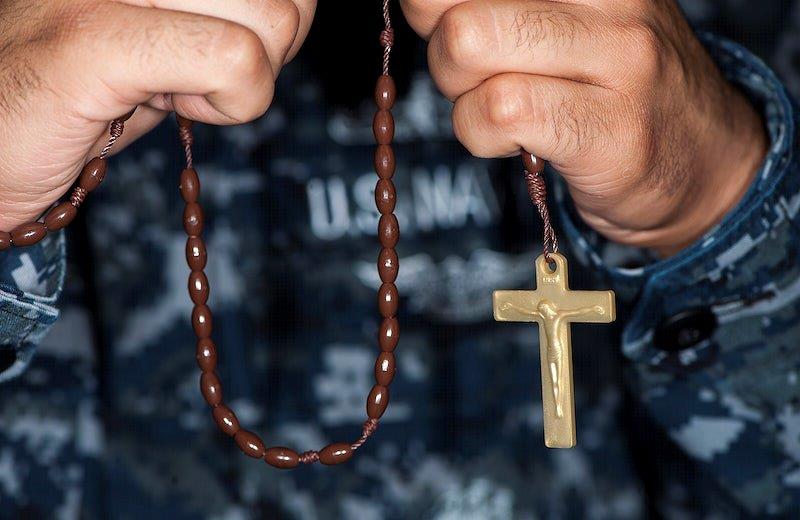 A patron saint medal: A patron saint medal is a traditional confirmation gift, and it’s a tangible reminder of the saint chosen as a confirmation name. It can be worn as a necklace or attached to a keychain.
A patron saint medal: A patron saint medal is a traditional confirmation gift, and it’s a tangible reminder of the saint chosen as a confirmation name. It can be worn as a necklace or attached to a keychain. -
A rosary: A rosary is a traditional Catholic devotion and is often given as a gift to confirmands. It’s a simple yet powerful tool for prayer and meditation.
-
A journal or notebook: A journal or notebook is a perfect gift for a confirmand as it allows them to reflect on their faith journey and write down their thoughts and prayers.
-
A religious artwork or statue: A religious artwork or statue is a great way to remind a confirmand of the beauty of their faith. It can be a statue of a saint, Jesus or Mary, which can be displayed in their room or any other place of the house.
-
A gift card for a pilgrimage or retreat: A gift card for a pilgrimage or retreat is a thoughtful and unique gift for a confirmand. It’s an opportunity for them to deepen their faith and to have a spiritual experience.
Confirmation is a significant sacrament in the Catholic Church, and it’s a great opportunity to give a thoughtful and meaningful gift. The gift should reflect the importance of this sacrament and encourage the confirmand in their faith journey. Consider one of these suggestions, or choose something that speaks to the individual and their interests.
Why is a patron saint medal is the perfect confirmation gift?
A patron saint medal is a traditional and meaningful gift for a Catholic who is being confirmed. This small piece of jewelry is more than just a trinket, it holds deep spiritual significance and can serve as a powerful reminder of the confirmand’s faith journey.
One of the main reasons why a patron saint medal is the perfect confirmation gift is that it connects the confirmand to their chosen saint. The confirmand chooses a patron saint as part of their confirmation and this saint becomes a role model and intercessor for them. A patron saint medal serves as a tangible reminder of this spiritual connection and can be worn as a necklace or attached to a keychain.
Another reason why a patron saint medal is the perfect confirmation gift is that it serves as a reminder of the confirmand’s commitment to their faith. Confirmation is a sacrament that marks a young person’s decision to fully embrace their faith and become a fully initiated member of the Church. A patron saint medal serves as a constant reminder of this commitment and can be worn as a symbol of their faith.
A patron saint medal also serves as a reminder of the confirmand’s spiritual journey. It’s a reminder of the saint’s virtues and the qualities that the confirmand would like to emulate in their own life. The confirmand can look to the saint as a guide and companion on their faith journey.
In conclusion, a patron saint medal is the perfect confirmation gift because it connects the confirmand to their chosen saint, serves as a reminder of their commitment to their faith, and serves as a reminder of their spiritual journey. It’s a meaningful and personal gift that can be worn as a symbol of the confirmand’s faith, and can be a constant reminder of their confirmation day.
Top 5 Confirmation gifts for teenage boys:
-
A pocket-sized New Testament or Psalms: A pocket-sized Bible can be a great gift for a teenage boy as it’s easy to carry and can provide inspiration and guidance throughout the day.
-
A rosary: A rosary is a traditional Catholic devotion and can be a great gift for a teenage boy as it helps them to connect with God and meditate on the mysteries of the faith.
-
A patron saint medal: A patron saint medal is a traditional confirmation gift, it can be worn as a necklace or attached to a keychain, and it serves as a reminder of the confirmand’s chosen saint.
-
A book on the lives of the saints: A book on the lives of the saints can be a great gift for a teenage boy as it provides inspiration and guidance on how to live out the faith.
-
A journal: A journal can be a great gift for a teenage boy as it allows them to reflect on their faith journey and write down their thoughts and prayers.
Top 5 Confirmation gifts for teenage girls:
-
A devotional book: A devotional book can be a great gift for a teenage girl as it provides inspiration and guidance on how to live out the faith.
-
A journal or notebook: A journal or notebook can be a great gift for a teenage girl as it allows them to reflect on their faith journey and write down their thoughts and prayers.
-
A patron saint medal: A patron saint medal is a traditional confirmation gift, it can be worn as a necklace or attached to a keychain, and it serves as a reminder of the confirmand’s chosen saint.
-
A rosary: A rosary is a traditional Catholic devotion and can be a great gift for a teenage girl as it helps them to connect with God and meditate on the mysteries of the faith.
-
Religious jewelry: Religious jewelry, such as cross earrings or a religious ring, is a beautiful and thoughtful gift that can help serve as a daily reminder of their faith.
What is the process of Confirmation in the Catholic Church?
The process of confirmation in the Catholic Church typically includes several steps:
-
Preparation: The individual seeking Confirmation typically begins a period of formation and instruction in the Catholic faith, which may include classes, retreats, or other activities. The purpose of this period is to deepen the individual’s understanding of their faith and to prepare them to receive the sacrament.
-
Selection of a sponsor: The individual seeking Confirmation will typically select a sponsor, who is a practicing Catholic in good standing with the Church. The sponsor acts as a guide and support for the individual throughout the Confirmation process.
-
Celebration of the sacrament: Confirmation is usually celebrated within the context of a Mass. The individual seeking Confirmation will be called forward and the bishop or priest will anoint their forehead with chrism oil and lay their hands on the individual, while saying a prayer of Confirmation.
-
Continuing formation: Confirmation is not a one-time event, but a lifetime commitment. The individual will continue to receive formation and education in their faith, and to grow in their relationship with God through prayer, study, and service.
It is worth noting that the process of Confirmation may vary depending on the diocese or region of the world, some places have different names for the classes or retreats, or even the age for Confirmation, but the principle stays the same, preparing and strengthening the faith of the individual.
What does Confirmandi mean?
 The word “Confirmandi” is a Latin term that means “those who are being confirmed.” It is the plural form of the word “Confirmandus,” which means “one who is being confirmed.” It is used to refer to individuals who are in the process of receiving the sacrament of Confirmation in the Catholic Church.
The word “Confirmandi” is a Latin term that means “those who are being confirmed.” It is the plural form of the word “Confirmandus,” which means “one who is being confirmed.” It is used to refer to individuals who are in the process of receiving the sacrament of Confirmation in the Catholic Church.
The word “Confirmandi” comes from the Latin verb “confirmare,” which means “to strengthen” or “to establish.” In the context of the sacrament of Confirmation, it refers to the strengthening of the individual’s faith and commitment to the Church.
In the Catholic Church, Confirmandi refers to individuals who are in the process of receiving the sacrament of Confirmation. This typically includes young people who have reached the age of reason and have undergone a period of formation and instruction in the Catholic faith. It also includes adult Catholics who have not yet received the sacrament of Confirmation. Confirmandi are typically teenagers or young adults but in some cases, adults who never got the chance to receive the sacrament in their youth also take part in the formation and receive the sacrament.
What are the sacraments in the Catholic Church?
There are seven sacraments in the Catholic Church:
-
Baptism: The sacrament of Baptism is the first sacrament of initiation in the Church. It is the sacrament by which an individual is initiated into the Catholic Church and made a member of the body of Christ. It is usually administered by pouring water over the head of the person being baptized while saying the words, “I baptize you in the name of the Father, and of the Son, and of the Holy Spirit.”
-
Confirmation: The sacrament of Confirmation is the second sacrament of initiation in the Church. It is the sacrament by which an individual receives the gifts of the Holy Spirit and is strengthened to live a life of faith and to bear witness to Christ in the world. It is usually administered by a bishop or priest who anoints the forehead of the person with chrism oil and lays his hands on the person while saying a prayer of Confirmation.
-
Eucharist: The sacrament of the Eucharist is the sacrament in which bread and wine are consecrated by a priest and become the body and blood of Christ. Catholics believe that during the Mass, the bread and wine are transformed into the body and blood of Jesus Christ and that through receiving the Eucharist, they are united with Christ and with the Church.
-
Reconciliation: The sacrament of Reconciliation is the sacrament by which an individual confesses their sins to a priest and receives forgiveness. Catholics believe that when they confess their sins to a priest, they are confessing to Jesus Christ and that through this sacrament, they receive God’s forgiveness and healing.
-
Anointing of the Sick: The sacrament of Anointing of the Sick is the sacrament by which a person who is ill or nearing death is anointed with oil by a priest and receives the grace of physical and spiritual healing.
-
Holy Orders: The sacrament of Holy Orders is the sacrament by which men are ordained as deacons, priests, or bishops in the Catholic Church. Through this sacrament, men receive the grace and authority to perform the sacred duties of their office and to serve the Church as ministers
How should a Catholic teenager should select their confirmation sponsor?
Choosing a confirmation sponsor is a significant decision for a Catholic teenager. A confirmation sponsor is a role model and guide who will accompany them on their faith journey. Here are some tips on how a Catholic teenager can select their confirmation sponsor.
-
Choose someone who is a practicing Catholic: It’s important to choose a sponsor who is a practicing Catholic and who is actively involved in their faith. They should be someone who can serve as a good example of living out the Catholic faith.
-
Choose someone who is a good listener: A confirmation sponsor should be someone who is a good listener and who can provide guidance and support. They should be someone who is willing to take the time to talk and listen to the teenager’s thoughts and concerns.
-
Choose someone who is knowledgeable about the faith: A confirmation sponsor should be someone who is knowledgeable about the Catholic faith and who can provide guidance and support in the teenager’s faith journey.
-
Choose someone who is available: A confirmation sponsor should be someone who is available and can make the time to meet with the teenager. It’s important to choose someone who is able to be present in the teenager’s life.
-
Choose someone who can be a spiritual guide: A confirmation sponsor should be someone who can serve as a spiritual guide, who can help the teenager deepen their relationship with God and grow in their faith.
-
Pray for guidance: Before making a final decision, pray for guidance and ask God to reveal the right person to be your confirmation sponsor. Trust that God will guide you in your decision.
In conclusion, choosing a confirmation sponsor is a significant decision for a Catholic teenager and it’s important to take the time to consider who would be the best fit for this role. It’s important to choose someone who is a practicing Catholic, a good listener, knowledgeable about the faith, available, and able to serve as a spiritual guide. Remember to pray for guidance and trust that God will guide you in your decision. A confirmation sponsor should be someone who will walk alongside you, support you and help you grow in your faith.
Prayers for new confirmation candidates
“Dear Lord, as we prepare for the sacrament of Confirmation, we ask for your guidance and strength. Help us to grow in our faith and deepen our relationship with you. Give us the courage to boldly proclaim our faith and to be a witness to your love in the world. We ask this through Christ our Lord. Amen.”
“Heavenly Father, we come before you with open hearts and minds, as we prepare to receive the sacrament of Confirmation. Grant us the wisdom and understanding to fully embrace our Catholic faith, and the courage to live it out in our daily lives. We ask for your guidance and protection as we continue on our journey of faith. We ask this through Christ our Lord. Amen.”
“Dear Holy Spirit, as we prepare for Confirmation, we ask for your continued guidance and inspiration. Help us to understand the gifts you have given us and to use them to serve others. Give us the strength to proclaim our faith boldly and to be a light in the world. We ask this through Christ our Lord. Amen.”
“Dear God, we come before you in humility and gratitude, as we prepare for the sacrament of Confirmation. We ask for your grace and blessings as we reaffirm our commitment to our Catholic faith. Give us the courage to live out our faith in all aspects of our lives and to be a shining example of your love to those around us. We ask this through Christ our Lord. Amen.”
“Dear Lord, we ask for your guidance and wisdom as we prepare to receive the sacrament of Confirmation. Help us to understand the importance of this sacrament and to fully embrace the gifts of the Holy Spirit. Strengthen our faith and give us the courage to be a witness to your love and truth in the world. We ask for your continued protection and guidance as we continue on our journey of faith. We ask this through Christ our Lord. Amen.”
“Dear God, we come before you with open hearts and minds as we prepare to receive the sacrament of Confirmation. We ask for your grace and blessings as we take this step in our faith journey. Help us to understand the gifts you have given us and to use them to serve others. Give us the courage to live out our faith in all aspects of our lives. We ask this through Christ our Lord. Amen.”
These prayers are a way for the candidates to express their gratitude, ask for guidance, and to invite the help of the Holy Spirit in the sacrament of confirmation. The candidates can use these prayers to focus their thoughts and to express their faith and commitment to God. These prayers are a way for the candidates to ask for grace, blessings, and strength as they take this important step in their faith journey.
Top Confirmation gifts for teenagers:
Confirmation
Medals and Pendants
Medals and Pendants
Confirmation
Prayer Card with Medal
Confirmation
Medals and Pendants
Medals and Pendants
By Type
Auto Accessories
By Type
Medals and Pendants


